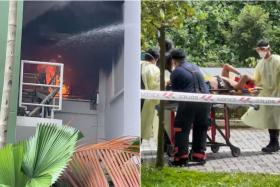Guide helps rescue teams from different countries cooperate
Personnel from 12 territories in region attend disaster relief workshop
Imagine a scenario where search and rescue personnel from China, Saudi Arabia and Brunei are brought together to carry out relief work.
With each team of personnel speaking their own language, communication and collaboration can become a major hurdle.
However, sharing a common code set out in the International Search and Rescue Advisory Group (Insarag) guidelines enables emergency relief teams from around the world to work seamlessly whenever and wherever disaster strikes.
This was one of the main objectives of the Asean Regional Forum (ARF) Workshop that was co-hosted by the Singapore Civil Defence Force (SCDF) and the China Earthquake Administration this week.
The three-day workshop, which ended yesterday, was the second to be held under the ARF.
About 100 search and rescue personnel from 12 territories in the region, such as the Philippines, Malaysia, Saudi Arabia and Brunei, were in Singapore for the workshop. The first one was held in Beijing in May.
It provides a platform for emergency relief teams to exchange techniques as well as understand each other's strengths and weaknesses, said Mr Zhuang Qian Jiang, 45, the leader of the China International Search and Rescue Team.
"This will help us work together when we meet on the ground," added Mr Zhuang, who was a workshop facilitator.
Yesterday, participants were tasked to "rescue" casualties in a partially collapsed building that had been "hit" by an earthquake, in a simulated exercise at the Home Team Tactical Centre in Mandai Quarry Road.
They were able to put into practice various skills and Insarag protocols they had learnt at the workshop.
Insarag guidelines are a set of internationally accepted procedures for emergency relief endorsed by the United Nations General Assembly Resolution.
They serve as a tool that unites search and rescue workers on the ground, said SCDF's Second Warrant Officer Mohammed Fayrus Abdul Rasit, 35, who attended the course.
SCDF's Lieutenant-Colonel Chew Keng Tok, 45, who was overall facilitator, said such workshops fostered better working relationships among emergency relief teams.
The Disaster Assistance and Rescue Team commander said: "When they part ways, there's still a connection.
And when they meet again there will be better collaboration."
Get The New Paper on your phone with the free TNP app. Download from the Apple App Store or Google Play Store now


